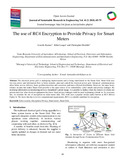| dc.description.abstract | The electrical power grid is undergoing improvements and is being transformed to the Smart Grid. Smart Grid uses two-way power and information flow to better monitor, plan and control the electrical power grid. Advanced communications allow better service delivery, faster problem detection and correction, and more efficient distribution. However, the same heavy reliance on data that makes Smart Grid possible is the same source of its vulnerability: cyber attacks and privacy leakages. By accessing information on monitoring such as a household’s power usage, it is possible to deduce when the owners of a home are present and even what electrical equipment they have. Such privacy leakages could be used in planning a break-in. To overcome this, we examine the use of encryption on smart meter data. This work uses a popular stream cipher known as RC4 (Rivest Cipher 4). We show that due to its low computational requirements, RC4 is a suitable candidate for encryption. | en_US |

